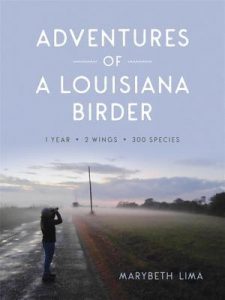Coastal Care Package
Louisiana boasts a beautiful landscape unique to our home. From the cypress trees (and knees!) of the marsh to towering live oaks in our parks, we have a state worth exploring — and protecting. We hope this care package can provide a much-needed break and allows you to dive into our roots no matter where you are.
Skip to a section
Exploring the Coast | Curl Up with a New Read | Quick Reads | Watch Coastal Films and Chill | For the Kids (And the Kids at Heart!) | Get Outside! | A few ways to (safely) support those in need
Exploring the Coast
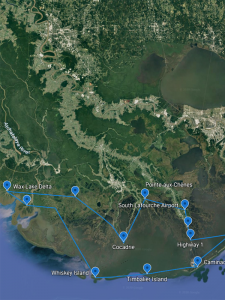 |
Virtual FlyoverExplore Louisiana’s coast from the comfort (and safety) of your own couch! An immersive 360-degree video offering a virtual view of a day in the Mississippi River Delta, exploring areas like the Wax Lake Delta and providing an overview of Louisiana’s land loss crisis. |
|
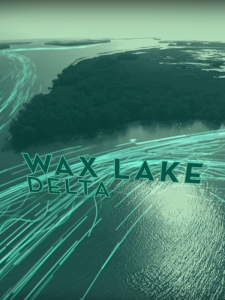 |
Coast 360An immersive 360-degree video offering a virtual view of a day in the Mississippi River Delta, exploring areas like the Wax Lake Delta and providing an overview of Louisiana’s land loss crisis |
|
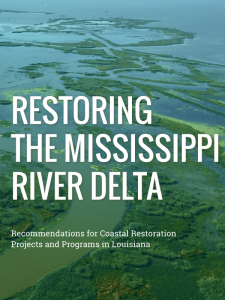 |
Priority Restoration ProjectsRestore the Mississippi River Delta has identified 17 projects in Louisiana’s 2017 Coastal Master Plan that, if prioritized and implemented quickly, will help restore and maintain as much of Louisiana’s coast as possible to achieve a resilient future. |
|
Curl Up with a New Read
New Orleans Public Library e-Resources: Orleans Parish residents who don’t have a library account can sign up for a temporary one at getacard.nolalibrary.org and access almost all of the e-Resources. If you live outside of Orleans Parish, be sure to check on the services your local library provides.
Quick Reads
- Recommendations to 10 Years After BP Oil Disaster – Restore the Mississippi River Delta recommends nine strategies for maintaining momentum on advancing critical ecosystem restoration in the delta, maximizing the investment opportunities of the oil spill settlement and engaging local communities in the restoration and resilience process.
- A Tale of Two Basins – To understand the issues of land loss affecting Louisiana’s coast and the restoration solutions needed to address it, one needs only compare two neighboring basins on the coast. In the Atchafalaya Basin, lush, green fingers of land push out toward the Gulf of Mexico, building more acreage every year. In the Terrebonne Basin to the east, land is rapidly disappearing at one of the highest rates on the planet.
- Claims vs. Realities: Fresh Water, Nutrients and Restoring the Mississippi River Delta – A blog looking at some of the claims that have been made about the high river and diversions after the 2019 Mississippi River Flood.
- A Cornerstone for Coastal Restoration: The Mid-Barataria Sediment Diversion – The Mid-Barataria Sediment Diversion is a cornerstone restoration project in the state’s Coastal Master Plan. The diversion is being designed to strategically mimic the natural riverine processes that built the Mississippi River Delta and to help build and maintain land in the degraded Barataria Basin.
- 15 Years After Katrina, a Fight Against ‘the Jim Crow of Climate Change’ Rages on in the Gulf Coast – This article is the second story in the Black in the Time of Climate Change series examining how Black communities across the United States experience and adapt to climate change. This story in particular focuses on climate activists of color and their exemplary work in the Gulf Coast.
- The Environmental Movement Should Reflect the Communities It Serves – This article highlights Audubon’s community engagement director of the Gulf Coast, Charles Allen III, and his work to engage historically black colleges and universities in coastal environmental efforts. He also speaks to the unfair barriers between communities of color and the environmental movement.
- It’s Time to Sounds the Alarm for Communities Most Vulnerable to the Coronavirus – Mustafa Santiago Ali discusses how the spread of COVID-19 threatens communities who have long suffered from environmental injustice and racial bias. Mustafa Santiago Ali is the vice president of environmental justice, climate and community revitalization for the National Wildlife Federation and previously served for 24 years at the Environmental Protection Agency.
- CWPPRA WaterMarks – The Coastal Wetlands Planning, Protection and Restoration Act’s WaterMarks Magazine offers a dive into a range of coastal stories.
- Atchafalaya – Comprehensive article written by John McPhee in 1987 studying the Mississippi River, its history and efforts made by the U.S. Army Corps of Engineers to control it.
Watch Coastal Films and Chill
- Last Call for the Bayou – The Louisiana-based 2019 film tackling the state’s land loss crisis and telling stories of people on the frontline will release for streaming on April 10.
- Films related to Hurricane Katrina – Treme, When the Levees Broke: A Requiem in Four Acts, Hurricane on the Bayou, Trouble the Water
- Films related to the 2010 BP oil disaster – The Great Invisible, The Big Fix, After the Spill
- Vanishing Paradise – Sportsmen discuss the importance of saving the Mississippi River Delta
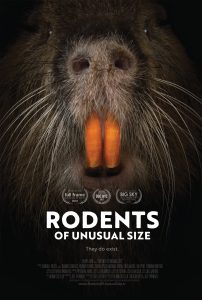 |
Rodents of Unusual Sizeard headed Louisiana fisherman Thomas Gonzales doesn’t know what will hit him next. After decades of hurricanes and oil spills he faces a new threat – hordes of monstrous 20 pound swamp rats that are eating up the coastal wetlands protecting Thomas and his town of Delacroix Island from hurricanes. |
|
- J’ai Été Au Bal / I Went to the Dance – The definitive film, by Les Blank and Chris Strachwitz, on the history of the toe-tapping, foot-stomping music of French Southwest Louisiana. The film includes many Cajun and Zydeco greats, featuring Michael Doucet and BeauSoleil, Clifton Chenier, Marc and Ann Savoy, D.L. Menard, and many others.
- MRGOing, Going Gone – Documentary film, a decade in the making, reveals the backstory of the Mississippi River Gulf Outlet—the infamous and now closed 76-mile shipping channel implicated in the catastrophic flooding following Hurricane Katrina. Though the Mississippi River Gulf Outlet was closed in 2009, the nation could potentially spend billions of dollars repairing the damage caused by it.
- Finding Common Ground: A Louisiana Documentary – Louisiana’s struggle to restore Louisiana’s Mississippi River Delta has resulted in a new Master Plan that embraces new advances in scientific knowledge— new tools for rebuilding the coast. Local, traditional ecological knowledge can also be a tool for cost saving planning. Finding Common Ground uses documentary film techniques to show how all those impacted by coastal erosion can cross over out of their silos, overcome long term psychological barriers, and achieve new understanding that may fast track restoration projects to build much needed new ground.
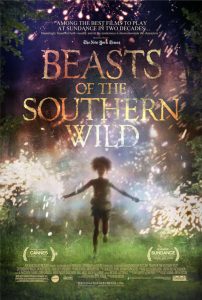 |
Beasts of the Southern WildFaced with both her hot-tempered father’s fading health and melting ice-caps that flood her ramshackle bayou community and unleash ancient aurochs, six-year-old Hushpuppy must learn the ways of courage and love. |
|
- The Louisiana Story (1948) – Young Alexander Napoleon Ulysses LaTour (Joseph Boudreaux) is a Cajun boy who lives with his family and his beloved pet raccoon in the Louisiana bayou. When his father (Lionel Le Blanc) allows an oil barge to drill on the family’s land, the boy has questions about the process and its safety. Although directed by noted documentary filmmaker Robert J. Flaherty and sometimes misidentified as a true story, this is a scripted film commissioned and paid for by a major oil company. [Available on Amazon Prime]
- The Kingdom of Zydeco (1994)
DC Environmental Film Fest – Stream dozens of environmental documentaries for free through March 31 (including two that focus on the 10 year anniversary of the BP oil spill).
For the Kids (And the Kids at Heart!)
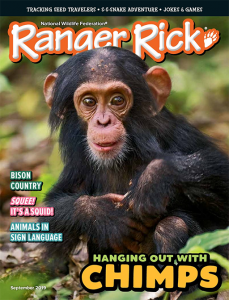 |
Ranger RickThe National Wildlife Federation will offer free, complimentary access to Ranger Rick online and the digital editions of its magazines during the COVID-19 shutdown of schools and daycare centers. The access will extend through June 30, 2020, and will only require an email address for access online. |
|
CWPPRA Teaching Curriculum and Learning LinksThis educational guide encourages students to think about what is at stake in terms of crucial wetland ecosystems, Gulf seafood populations, North American migratory bird and waterfowl populations, the nation’s energy infrastructure and national security, interior navigation and water transport for American produce and goods, and a totally unique American culture. |
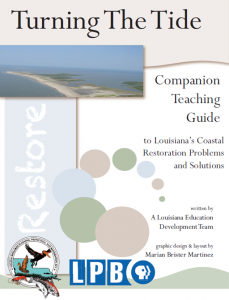 |
|
- NOAA online toolkits for environmental education
- Lake Pontchartrain Basin Foundation offers videos for remote learning in their Lighthouse Learning Lab.
Live Animal Webcams
Audubon Nature Institute | California Academy of Sciences | Cincinnati Zoo: Home Safari Facebook Lives | Monterey Bay Aquarium | San Diego Zoo | Smithsonian’s National Zoo’s Panda Cams | The National Aquarium
Get Outside!
On March 22, Gov Edwards issued a Stay at Home Order directing all Louisiana residents to shelter at home and limit movements outside of their home beyond essential needs. Under this order, Louisianans can “engage in outdoor activity, provided individuals maintain a distance of six feet from one another and abide by the 10-person limitation on gathering size.”
- Creole Nature Trail Adventure Point – Start your journey on the Creole Nature Trail – an All-American Road linking Lake Charles with the state’s rugged, southwest coastline. The visitor center located at Adventure Point is closed however, the Creole Nature Trail is still open and available for the public to drive on.
- Lake Fausse Pointe State Park – On the edge of the Atchafalaya Basin, Lake Fausse Pointe offers a great escape for boating, fishing, hiking and more. Trails are still open to the public as of 3/23/2020.
- Garden for Wildlife – Reclaiming wildlife habitat yard by yard is a vital step anyone can take just outside their door. Re-establishing native plant communities and protecting the local watershed with sustainable gardening practices is what gardening for wildlife is all about.
- The Joy of Birds – Birds bring us happiness in so many ways—especially in trying times. Whether you’re just looking for a lift, unable to enjoy the outdoors, or in desperate need of distraction, look no further than this birdy care package, from Audubon to you.
Take Action to Help the Coast, Your Community and Those in Need
- Food-love for hospital workers in NoLa – Fundraiser by Krewe of Red Beans that supports local restaurants by feeding hospital workers on the front lines. So far they have been able to provide 900 meals delivered (breakfast, lunch, dinner) to 11 hospitals (ER’s and ICUs) daily.
- Restaurant Workers Relief Program – Fundraiser by the LEE Initiative, Makers Mark, and the Link Restaurant Group to provide meals and supplies to restaurant workers who have been laid-off or have had a significant reduction in hours and/or pay. Donations made from New Orleans will go to the New Orleans program.
- The Greater New Orleans Foundation has activated its Response and Restoration Fund in response to the new coronavirus (COVID-19) Pandemic. The Response and Restoration Fund supports a network of voluntary and community organizations taking care of our elderly, the homeless and low-wage workers who are made more vulnerable by this pandemic.
- Second Harvest Food Bank is welcoming donations of fresh produce and non-perishable food items, as well as donations of cleaning supplies, soap and hand sanitizer.
- Supplies for Saints is a New Orleans organization supporting our healthcare workers who are on the front lines of COVID-19. Supply for Saints is connecting local hospitals in need of medical masks, gowns, and gloves, with providers who are able to donate.
- The New Orleans Council on Aging is taking financial donations to support seniors through its Meals on Wheels program and other services.
- Ozanam Inn is committed to staying open and supporting our neighbors experiencing homelessness.
- Recovering America’s Wildlife Act – If we are serious about saving thousands of at-risk species, we must invest in collaborative, on-the-ground solutions that match the magnitude of the wildlife crisis. The Recovering America’s Wildlife Act is the bipartisan solution we need. Urge Congress to support this bill to save America’s vulnerable wildlife.
